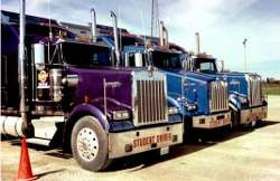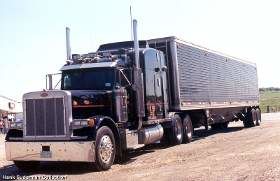What State Pays Entry Drivers Best?
Topic 6963 | Page 1

I'm in California right now, I was thinking heading to Alabama and starting from there.
There is no "best" place.
Every state has basically the same thing when it comes to frieght.. the biggest chains that I've seen is Dollar General, walmart, Sam's club, home depot, lowes. They all have DC's everywhere. Doesn't matter if your in Alabama or new york. There's frieght. The only place I could think of that really doesn't get frieght out is Florida and the North East like Maine, Rhode Island..
If your thinking of going to Alabama, you'll need to get your license switched over there and if you already have your CDL you may need to read take all the written exams.
Good pay and home time are big things to look at when Choosing the right Company.
Prime is a good place to start, we have several drivers here who are doing well with them, they pay the highest for new drivers plus solid pay through training, they don't do so well for home time from what I hear though.
There are other Trucking Companies to look into and even some that offer Company-Sponsored Training which doesn't require you to pay anything out of pocket for your CDL.
CDL:
Commercial Driver's License (CDL)
A CDL is required to drive any of the following vehicles:
- Any combination of vehicles with a gross combined weight rating (GCWR) of 26,001 or more pounds, providing the gross vehicle weight rating (GVWR) of the vehicle being towed is in excess of 10,000 pounds.
- Any single vehicle with a GVWR of 26,001 or more pounds, or any such vehicle towing another not in excess of 10,000 pounds.
- Any vehicle, regardless of size, designed to transport 16 or more persons, including the driver.
- Any vehicle required by federal regulations to be placarded while transporting hazardous materials.
Company-sponsored Training:
A Company-Sponsored Training Program is a school that is owned and operated by a trucking company.
The schooling often requires little or no money up front. Instead of paying up-front tuition you will sign an agreement to work for the company for a specified amount of time after graduation, usually around a year, at a slightly lower rate of pay in order to pay for the training.
If you choose to quit working for the company before your year is up, they will normally require you to pay back a prorated amount of money for the schooling. The amount you pay back will be comparable to what you would have paid if you went to an independently owned school.
Company-sponsored training can be an excellent way to get your career underway if you can't afford the tuition up front for private schooling.
OOS:
When a violation by either a driver or company is confirmed, an out-of-service order removes either the driver or the vehicle from the roadway until the violation is corrected.

Sid your question is a little vague. The need for truckers extends to every state. Being a Otr driver means that it really doesn't matter where you reside. When you have down time they try to send loads to where you live to get your days off. The best states to reside in are the ones with the lowest tax rates. Texas and Florida both have no state income tax so they are high on the list. Local or regional jobs are a little different. Remember the best paying jobs are probably in the N.E. But the cost of living is higher as well. My suggestion to you is to find a place you want to live and don't let the job be the issue. One small side note, some companies are not hiring in certain regions. If you plan working for one of these companies that may effect your decision.
Regional:
Regional Route
Usually refers to a driver hauling freight within one particular region of the country. You might be in the "Southeast Regional Division" or "Midwest Regional". Regional route drivers often get home on the weekends which is one of the main appeals for this type of route.
OTR:
Over The Road
OTR driving normally means you'll be hauling freight to various customers throughout your company's hauling region. It often entails being gone from home for two to three weeks at a time.
Yeah, you can make just as much money out of California as you can anywhere else. Now someday if you'll be looking for better home time opportunities, like if you decide to start a family, you'll want to be closer to a major city. That's where the majority of local jobs will be that get you home every night.
But since home time doesn't matter right now there's no reason to leave California for a truck job. As was mentioned, Florida and the extreme Northeast are probably the toughest areas for trucking opportunities but most everywhere else is just fine.

Surprised nobody responded to a particular subject you brought up in your post. You aren't going to clear (after taxes, your net) 30-40k your first year at any truckload gig, save for perhaps a specialty job like an oil field job, or a tanker job. Even a tanker job would be pushing it. To make the kind of money you're talking about, you'd have to gross around 50k + in order to net 30-40k. 50k is the type of income level that an experienced driver would get at an OTR gig, or most truckload jobs. A safe first year number for rookie drivers at a truckload company is around 30-35k GROSS.
If you want to make the kind of money you're talking about, you should consider LTL positions, either P&D or linehaul. Linehaul will pay the most. Even rookie drivers at a LTL company can make around 50k as a P&D driver, and 70k+ as a linehaul driver.
And that brings me to my next point. The other folks mentioned that location doesn't particularly matter, but they're likely referring to truckload jobs, like OTR gigs. With LTL, you need to be close to a terminal. If you are considering moving, and you want to maximize your income, AND you're not dreaming about the lifestyle of an OTR trucker, then the northeast will give you lots of opportunities for LTL. Depending on where you are in CA, you might have some great opportunities for LTL. I reside in the northeast, and there are plenty of LTL companies to choose from at my location. Where there is one LTL company, there will be another.
If you're interested in LTL or want to learn more about it, I started a thread documenting my linehaul job.
As a rookie driver with my LTL company, running linehaul, my YTD gross so far is about 30k, that's since I was hired at the end of July. My first month was hourly while training, until I went solo. In the beginning after I went solo and moved to cpm , I was slow, and only would churn out about 1800-2000 miles a week. Regardless, I fully expect to break 70k my first year for gross earnings.
Some drivers choose OTR because they want the lifestyle - that's cool. I got into trucking to support my family, and I also happen to like trucks and driving. But, I don't like trucks to the extent that I'm willing to be away from what matters most to me - my family. Trucking for me is a job, not a lifestyle. I do LOVE my job though, and getting paid well makes the 12-14 hour days well worth the sacrifice.
I'd never argue with somebody that LTL is 'better' than OTR, but you definitely get paid more with LTL. Different strokes for different folks. There is no right or wrong job, only what fits your needs. My response is based on the assumption that you want to maximize your income, and you don't mind relocating to do so. But keep in mind that if you do want that OTR lifestyle, you aren't going to make the kind of money you're hoping for until you become an experienced driver with a top paying truckload company.
Terminal:
A facility where trucking companies operate out of, or their "home base" if you will. A lot of major companies have multiple terminals around the country which usually consist of the main office building, a drop lot for trailers, and sometimes a repair shop and wash facilities.
LTL:
Less Than Truckload
Refers to carriers that make a lot of smaller pickups and deliveries for multiple customers as opposed to hauling one big load of freight for one customer. This type of hauling is normally done by companies with terminals scattered throughout the country where freight is sorted before being moved on to its destination.
LTL carriers include:
- FedEx Freight
- Con-way
- YRC Freight
- UPS
- Old Dominion
- Estes
- Yellow-Roadway
- ABF Freight
- R+L Carrier
OTR:
Over The Road
OTR driving normally means you'll be hauling freight to various customers throughout your company's hauling region. It often entails being gone from home for two to three weeks at a time.
P&D:
Pickup & Delivery
Local drivers that stay around their area, usually within 100 mile radius of a terminal, picking up and delivering loads.
LTL (Less Than Truckload) carriers for instance will have Linehaul drivers and P&D drivers. The P&D drivers will deliver loads locally from the terminal and pick up loads returning to the terminal. Linehaul drivers will then run truckloads from terminal to terminal.
Linehaul:
Linehaul drivers will normally run loads from terminal to terminal for LTL (Less than Truckload) companies.
LTL (Less Than Truckload) carriers will have Linehaul drivers and P&D drivers. The P&D drivers will deliver loads locally from the terminal and pick up loads returning them to the terminal. Linehaul drivers will then run truckloads from terminal to terminal.CPM:
Cents Per Mile
Drivers are often paid by the mile and it's given in cents per mile, or cpm.
OOS:
When a violation by either a driver or company is confirmed, an out-of-service order removes either the driver or the vehicle from the roadway until the violation is corrected.
New Reply:
New! Check out our help videos for a better understanding of our forum features

















Preview:
This topic has the following tags:
Choosing A Truck Driving School Choosing A Trucking Company Truck Driver Salary







 TT On Facebook
TT On Facebook
So I saved a bit of money up and want to start driving somewhere that gets me to at least 32-40k after taxes my first year. I realize that there's a lot of factors that go into choosing the right company but that aside, on average from you experienced guys, what regions have the best accounts? I'm looking for something that might offer me steady and plenty of miles, home time is not an issue. Any suggestions? I'd be fresh out of cdl school
CDL:
Commercial Driver's License (CDL)
A CDL is required to drive any of the following vehicles:
OOS:
When a violation by either a driver or company is confirmed, an out-of-service order removes either the driver or the vehicle from the roadway until the violation is corrected.